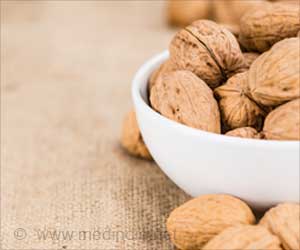The University of South Australia study, published in the journal Nutrients, also reveals that walnuts may help to mitigate the impacts of academic stress on the gut flora during stressful times, particularly in women (
).
According to the study’s lead authors, Ph.D. student Mauritz Herselman and Associate Professor Larisa Bobrovskaya, the findings add to the growing body of data associating walnuts to improved brain and gastrointestinal health.
Advertisement
“Students experience academic stress throughout their studies, which has a negative effect on their mental health, and they are particularly vulnerable during exam periods,” Herselman says.
Eighty undergraduate students were clinically tested three times: before the start of a 13-week university semester, throughout the examination period, and two weeks after the examination period. Those in the treatment group were given walnuts to eat every day for 16 weeks at these three intervals.
Walnuts are Linked to Better Sleep Pattern
“We found that those who consumed about half a cup of walnuts every day showed improvements in self-reported mental health indicators. Walnut consumers also showed improved metabolic biomarkers and overall sleep quality in the longer term.”
Walnuts a Boon -can Lower Risk of Depression, Improve Concentration
Students in the control group reported higher levels of stress and depression in the run-up to exams, whereas those in the therapy group did not. When compared to the controls, walnut users reported a substantial decrease in sensations linked with depression between the first and final visits.
Previous researches have found that walnuts include omega-3 fatty acids, antioxidants, melatonin (sleep producing hormone), polyphenols, folate, and vitamin E, all of which support brain and gut health.
“The World Health Organization has recently stated that at least 75 percent of mental health disorders affect people under the age of 24 years, making undergraduate students particularly vulnerable to mental health problems,” Herselman says.
According to Associate Professor Larisa Bobrovskaya, mental health illnesses are frequent among university students and can have a negative impact on academic performance as well as long-term physical health.
“We have shown that consuming walnuts during stressful periods can improve mental health and general wellbeing in university students, as well as being a healthy and delicious snack and a versatile ingredient in many recipes, to fight some negative effects of academic stress,” Assoc. Prof Bobrovskaya says.
“Due to fewer numbers of males in the study, more research is needed to establish sex-dependent effects of walnuts and academic stress in university students. It’s also possible that a placebo effect might have come into play as this was not a blind study.”
Thus, it can be concluded that daily consumption of walnuts increased total protein and albumin levels, and can protect against the negative effects of academic stress on metabolic biomarkers.
In the weeks running up to their next exam, stressed-out university students may want to include walnuts in their regular diet.
Reference :
- The Effects of Walnuts and Academic Stress on Mental Health, General Well-Being and the Gut Microbiota in a Sample of University Students: A Randomised Clinical Trial – (https:www.mdpi.com/2072-6643/14/22/4776)
Source: Medindia



